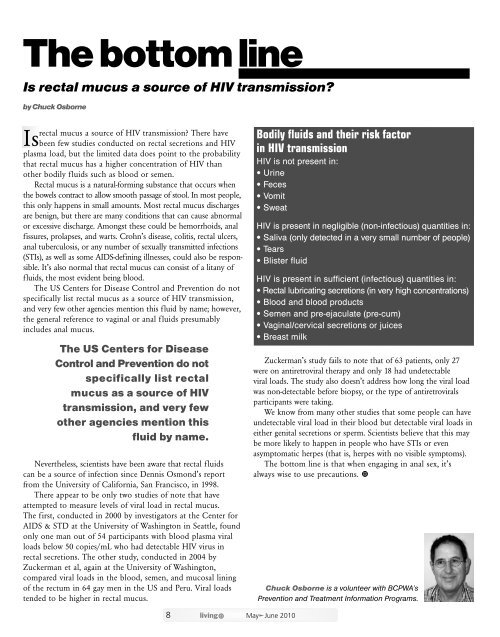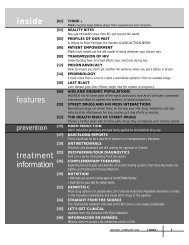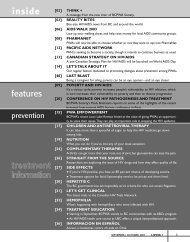liv poz mag.qxd - Positive Living BC
liv poz mag.qxd - Positive Living BC
liv poz mag.qxd - Positive Living BC
You also want an ePaper? Increase the reach of your titles
YUMPU automatically turns print PDFs into web optimized ePapers that Google loves.
The bottom line<br />
Is rectal mucus a source of HIV transmission?<br />
by Chuck Osborne<br />
rectal mucus a source of HIV transmission? There have<br />
Isbeen few studies conducted on rectal secretions and HIV<br />
plasma load, but the limited data does point to the probability<br />
that rectal mucus has a higher concentration of HIV than<br />
other bodily fluids such as blood or semen.<br />
Rectal mucus is a natural-forming substance that occurs when<br />
the bowels contract to allow smooth passage of stool. In most people,<br />
this only happens in small amounts. Most rectal mucus discharges<br />
are benign, but there are many conditions that can cause abnormal<br />
or excessive discharge. Amongst these could be hemorrhoids, anal<br />
fissures, prolapses, and warts. Crohn’s disease, colitis, rectal ulcers,<br />
anal tuberculosis, or any number of sexually transmitted infections<br />
(STIs), as well as some AIDS-defining illnesses, could also be responsible.<br />
It’s also normal that rectal mucus can consist of a litany of<br />
fluids, the most evident being blood.<br />
The US Centers for Disease Control and Prevention do not<br />
specifically list rectal mucus as a source of HIV transmission,<br />
and very few other agencies mention this fluid by name; however,<br />
the general reference to vaginal or anal fluids presumably<br />
includes anal mucus.<br />
The US Centers for Disease<br />
Control and Prevention do not<br />
specifically list rectal<br />
mucus as a source of HIV<br />
transmission, and very few<br />
other agencies mention this<br />
fluid by name.<br />
Nevertheless, scientists have been aware that rectal fluids<br />
can be a source of infection since Dennis Osmond’s report<br />
from the University of California, San Francisco, in 1998.<br />
There appear to be only two studies of note that have<br />
attempted to measure levels of viral load in rectal mucus.<br />
The first, conducted in 2000 by investigators at the Center for<br />
AIDS & STD at the University of Washington in Seattle, found<br />
only one man out of 54 participants with blood plasma viral<br />
loads below 50 copies/mL who had detectable HIV virus in<br />
rectal secretions. The other study, conducted in 2004 by<br />
Zuckerman et al, again at the University of Washington,<br />
compared viral loads in the blood, semen, and mucosal lining<br />
of the rectum in 64 gay men in the US and Peru. Viral loads<br />
tended to be higher in rectal mucus.<br />
Bodily fluids and their risk factor<br />
in HIV transmission<br />
HIV is not present in:<br />
• Urine<br />
• Feces<br />
• Vomit<br />
• Sweat<br />
HIV is present in negligible (non-infectious) quantities in:<br />
• Sa<strong>liv</strong>a (only detected in a very small number of people)<br />
• Tears<br />
• Blister fluid<br />
HIV is present in sufficient (infectious) quantities in:<br />
• Rectal lubricating secretions (in very high concentrations)<br />
• Blood and blood products<br />
• Semen and pre-ejaculate (pre-cum)<br />
• Vaginal/cervical secretions or juices<br />
• Breast milk<br />
Zuckerman’s study fails to note that of 63 patients, only 27<br />
were on antiretroviral therapy and only 18 had undetectable<br />
viral loads. The study also doesn’t address how long the viral load<br />
was non-detectable before biopsy, or the type of antiretrovirals<br />
participants were taking.<br />
We know from many other studies that some people can have<br />
undetectable viral load in their blood but detectable viral loads in<br />
either genital secretions or sperm. Scientists believe that this may<br />
be more likely to happen in people who have STIs or even<br />
asymptomatic herpes (that is, herpes with no visible symptoms).<br />
The bottom line is that when engaging in anal sex, it’s<br />
always wise to use precautions. 5<br />
Chuck Osborne is a volunteer with <strong>BC</strong>PWA’s<br />
Prevention and Treatment Information Programs.<br />
8 <strong>liv</strong>ing5 MayqJune 2010











